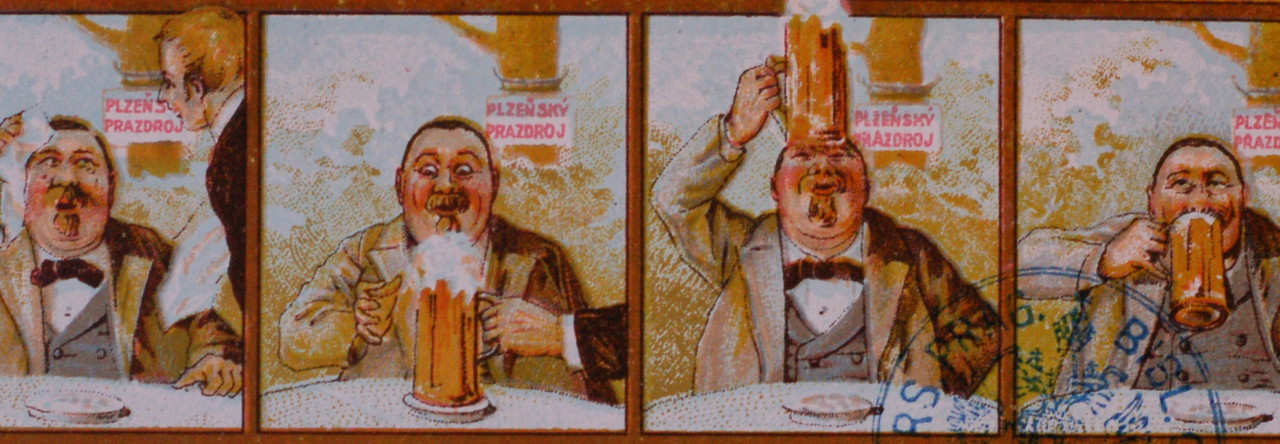
Last year I was invited to work for the Czech newspaper Lidové noviny as their weekly restaurant reviewer. For most of us, that might sound like a dream job, but I had already spent more than five years as the restaurant reviewer at the Prague Post, even seeing a story from there included in Best Food Writing 2005, and I had little interest in returning to the same task, especially since I was having so much fun writing travel stories from all around Europe. Despite being flattered by the offer, I passed, suggesting instead that the editors contact the Prague Spoon‘s Laura Baranik, who has since taken to it swimmingly.
But resolutions are meant to be broken, and I’ve recently agreed to occasionally review a few restaurants for Lidové noviny, either when Ms. Baranik is on vacation or as a means of helping out with what I know is very stressful, very demanding work.
To be honest, I’ve enjoyed writing reviews again much more than I thought I would. I even managed to get something about good beer into this weekend’s article.
Here’s a piece on the expat-friendly restaurant Vermeer, which got the local spodní prádlo in a clove hitch when word of its classic American diner sandwiches first hit the food forum at Expats.cz. In case you’d rather read it in English, I’ll post the entire English version at some point, but for now, here’s the relevant paragraph:
This kind of food goes extremely well with a great beer, but Vermeer offers Krušovice Mušketýr (35 Kč per .5l) with Heineken (65 Kč) as its top choice on draft, which the owner told me is because he wants to provide what foreigners want. Speaking as a foreigner, I can tell you I didn’t move to the Czech Republic to drink Dutch beer. What I want — and what many other expatriates here are absolutely crazy about — are the outstanding, extremely flavorful beers from small producers like Pivovar Kout na Šumavě and Pivovar Kocour Varnsdorf. Personally, I’d gladly pay a higher price for those beers. For Krušovice, not unless I’m very thirsty. For Heineken, absolutely never.
Call it one small strategic strike for craft beer in Prague. But the bigger picture is this: restaurateurs may care (or claim to care) about the food and drink they serve. But in a beer-loving country like the Czech Republic, a restaurant owner who cares enough to have food items imported especially for him will still offer the biggest, blandest, most mass-produced beer around.
I undertand it’s hard to watch over every single aspect of your restaurant, and if you haven’t had any kind of education in beer, it might be hard to understand what difference it makes. But believing that your customers prefer to drink overpriced Heineken — a so-called “Pilsner” — in the very country that invented Pilsner brewing? In a country that loves beer so much it drinks more of it than anyone else in the world?
Just hypothetically: if you opened a stylish restaurant in, say, Paris, how much attention would you pay to the wine? Do you think that if you offered a high-volume cabernet sauvignon or a so-called “Burgundy” from the biggest industrial winery in California, your customers would be into that? Would you tell people it’s because that’s what tourists want?
Well, just my 40 hellers. In any case, I’ll be reviewing regularly while Ms. Baranik is out this month; after that, I’ll continue to contribute pieces to Lidové noviny occasionally, in addition to my regular work for Concierge.com (where I cover Prague, Budapest, Ljubljana, Dubrovnik and the Dalmatian Coast), and the travel section of the New York Times (where so far I’ve reviewed restaurants in Prague, Budapest and Vienna). At the moment I’m not planning to sneak craft beer references into forthcoming restaurant reviews in any of those publications. But you know, sometimes plans change.




Jay
I’m glad you mentioned this. This seems to be a common problem in Prague. The unfortunate part of it all seems to be that some Czechs prefer these foreign lagers. Over the past year or two I had countless conversations with Czechs who said that their favorite beer was Stella. I guess since these beers (Stella, Heineken) are relatively new to the Czech market, Czechs want to try what they feel they’ve been missing out on. I hope the “new” does wear off soon though.
pivero
I’m sorry, but I can’t believe the owner of Vermeer. If he really wanted to provide what foreigners want, he would be selling Pilsner Urquell that has topped the list of best beer for the readers of The Prague Post for ages.
IMO, either the place was already tied to Krušovice or Heineken CZ made him a good offer. Both are cases I know from a couple of my wife’s clients (she sells furnishings for restaurants). I see the latter as more likely. Heineken seems to be using the strategy that served Stella so well a few years back, introducing their brand at places where people don’t go for the beer, but would drink it anyway.
There are some Czechs that like Stella or Heineken, but they are few and far between. The ones I’ve met were all yuppies that would not set foot in a hospoda, but would rather go to fancier places, and those are the spots where those beers thrive.
There is also another reason why some places decide to stock these beers, people don’t like them, don’t drink them very much, choosing more profitable drinks instead, as I reported here.
Velky Al
Very true Pivero, I am yet to meet a Czech who actually likes beer and will drink Stella or Heineken. Stella is seen as a status symbol, about being westernised almost – as ridiculous as that sounds (especially given its “wifebeater” reputation amongst Brits).
Evan Rail
I think that’s right, I don’t think Stella or Heineken are the favorites of people who really like beer here. I think people here who “prefer” Stella or Heineken are generally not people who are really into beer, and from a business point of view, catering to them might not be such a great idea: they’re just as likely to drink something else as order a beer. But then again, no one ever went broke underestimating the tastes of the general public.
It’s worth pointing out that Vermeer also has “fancy” leather-bound menus… with “Krušovice” printed on the cover. Not the name of the restaurant.
Personally, I think that looks cheap, but what do I know? I’m just the restaurant reviewer.
pivero
“It’s worth pointing out that Vermeer also has “fancy” leather-bound menus… with “Krušovice” printed on the cover. Not the name of the restaurant.”
I think that proves my point about why Vermeer is really selling Krušovice – Heineken.
Knut Albert
I liked the “For Heineken, absolutely never.”
Well, maybe on a transatlantic flight if the other chice is Miller Light…
majk
Have you ever been to Prazsky most restaurant on Betlemska? I was only there once, didn’t bother with the food, but just stopped in with a friend because I was passing by and noticed they had Rohozec and needed a break from Christmas shopping. According to the menu they have a house brew as well, but I only noticed that afterwards and was set on the Rohozec anyhow. Would be interesting to see if the food there is any good, as the beer was excellent and the decor original.
Evan Rail
Hey Mike,
Yeah, I’ve been to Pražský most: the house beer wasn’t astonishingly fantastic on my visit, and I thought the prices were high. You can read a similar evaluation from Max Bahnson, who recounts his trip to Pražský most here:
http://pivni-filosof.blogspot.com/2008/06/we-had-to-wait-so-long.html
After my visit, I thought about those Thai restaurants in Europe and America which boast that all of their cooks came from Thailand. Wonderful! They’re all from Ang Thong! But what if they don’t know how to cook? What if the restaurant has filled its kitchen, say, with a bunch of unemployed carpenters from Thailand? Is that why my pad see ew tastes like sawdust?
Meaning: a beer isn’t good simply because it comes from a microbrewery or brewpub. A beer is good because it is good. Obvious and banal, sure, but maybe still worth remembering.